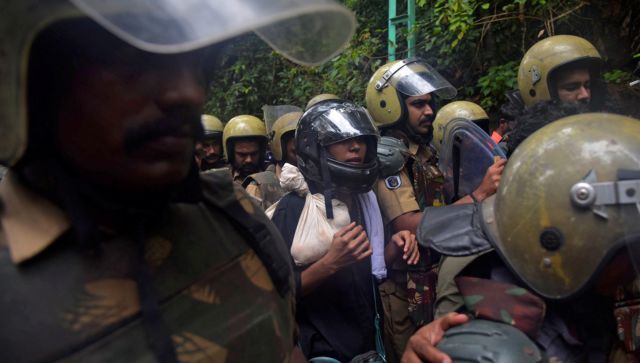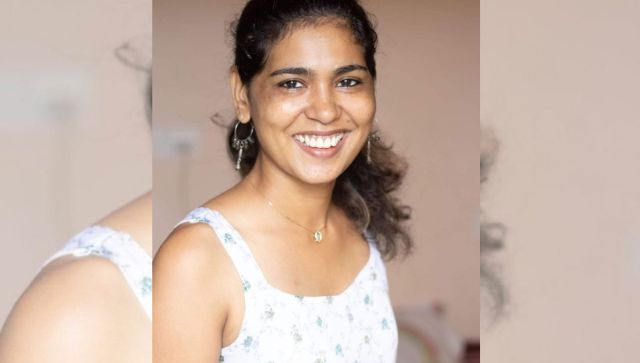‘Nudity not always obscene': POCSO case against Rehana Fathima
The Kerala High Court has dismissed a criminal case against women’s rights activist Rehana Fathima. She courted controversy in June 2020 after a video showing her two minor children painting on her semi-naked body created outrage

Rehana Fathima has been embroiled in a number of controversies in the past. Image Courtesy: Facebook/Rehana Fathima)
The Kerala High Court Monday (5 June) dismissed the criminal case against activist Rehana Fathima for posting a video on social media of her minor son and daughter painting on her semi-naked body. Noting that it is “wrong to classify nudity as essentially obscene or even indecent or immoral”, Justice Kauser Edappagath said, as per Bar and Bench: “Nudity should not be tied to sex. The mere sight of the naked upper body of the woman should not be deemed to be sexual by default. So also, the depiction of the naked body of a woman cannot per se be termed to be obscene, indecent, or sexually explicit. The same can be determined to be so only in context”.
After her video posted in 2020 created a backlash, a case was filed against Fathima under Sections 13, 14, and 15 of the Protection of Children from Sexual Offences (POCSO) Act, 2012, Section 67B (d) of the Information Technology Act, 2000, and Section 75 of the Juvenile Justice (Care and Protection of Children) Act, 2015.
Who is Rehana Fathima, what were her reasons to post the video and what are the important observations made by the Kerala High Court in the case? We explain.
Related Articles
Who is Rehana Fathima?
Rehana Fathima was born in an orthodox Muslim family. According to Indian Express, her concept of religion changed after her father’s death.
The women’s activist, who is in her 30s, has dealt with a fair share of controversies several times now.
Accompanied by her partner Manoj K Sreedhar, she participated in the ‘Kiss of Love’ protest in Kochi in 2014 against moral policing.
In October 2018, Fathima, along with Hyderabad journalist Kavitha Jakkal, was among the first women to try to visit Sabarimala amid heavy police presence following a landmark Supreme Court order allowing women of all ages to enter the temple.
However, Fathima had to return just 500 metres away from the temple’s main sanctum sanctorum after a right-wing mob blocked their entry, as per Indian Express.

The same year when a male college teacher compared women’s breasts to watermelons, the activist retorted by uploading a photo covering her breasts with only watermelons.
In November 2018, she was arrested by the police for allegedly insulting religious sentiments through her posts on Facebook. After spending 18 days in jail, she was granted conditional bail in the case by the Kerala High Court.
Fathima, who worked as a telecom technician with BSNL, was axed from her job in May 2020 following an internal inquiry into the criminal cases against the activist, reported Indian Express.
She has also starred in the art film Eka which talks about intersexuality.
As per The Quint, Fathima was one of the first women to take part in Pulikkali, Thrissur’s annual Onam tiger dance, in 2016. The traditional dance is usually performed by men dressed like tigers during the Onam festival.
She counters lewd comments on her photographs, mostly from men, with more “provocative” images, noted Indian Express. “The more you pay heed to regressive comments, the more freedom is chained. It’s my body and I have the right to wear what I want,” the activist told The Times of India in 2018.
The POCSO case against Fathima
As per Indian Express, posting the video on her social media with the hashtag Body Art and Politics, Fathima wrote in June 2020: “No child who has seen his own mother’s nakedness and body can abuse the female body. Therefore, vaccines against false perceptions about women’s body and sexuality should be initiated from home.”
The video created massive outrage, with the Kerala State Commission for Protection of Child Rights asking the police to file a case against her under provisions of the POCSO Act.

Multiple FIRs were filed and her anticipatory bail was rejected. Later she was granted conditional bail by a special court.
Fathima told the High Court earlier that she aimed to impart sexual education through her video and challenge the stigma associated with women’s bodies, according to The Quint.
What did Kerala High Court say now?
In a significant judgement, the High Court pointed out the differing attitudes of society towards male and female nudity.
“Body painting on men is an accepted tradition during Pulikali festivals in Thrissur, Kerala. When Theyyam and other rituals are performed at the temple, painting is conducted on the bodies of male artists. The male body is displayed in the form of six-pack abs, biceps etc. We often find men walking around without wearing shirts. But these acts are never considered to be obscene or indecent,” Justice Edappagath was quoted as saying by The Wire.
“When the half-nude body of a man is conceived as normal and not sexualised, a female body is not treated in the same way. Some people are so used to considering a woman’s naked body as an overly sexualised one or just an object of desire. There is another dimensional view about female nudity – that is, female nudity is taboo because a naked female body is only meant for erotic purposes,” he added.
Justice Edappagath concurred with Fathima’s argument that the video of her children painting on her body “cannot be characterised as a real or simulated sexual act nor can it be said that the same was done for the purpose of sexual gratification or with sexual intent”.
Rejecting the prosecution’s argument that the video was obscene because Fathima’s upper body was visible, the court said that nudity and obscenity are not the same thing. “It is wrong to classify nudity as essentially obscene or even indecent or immoral,” the judge added.
The High Court said the case could have an adverse effect on her children. “No doubt, the prosecution of the petitioner (Fathima) will have torture and adverse effect on the children. Hence, in the best interest of the victims also, the prosecution cannot be allowed to be continued,” the order said.
With inputs from agencies
Read all the Latest News, Trending News, Cricket News, Bollywood News,
India News and Entertainment News here. Follow us on Facebook, Twitter and Instagram.
also read

Both SDPI, PFI are 'extremist organisations' indulging in serious acts of violence, says Kerala HC
The court passed the verdict while dismissing a plea seeking a CBI investigation into the 15 November murder of an RSS worker in Palakkad district, Kerala

Kerala: State transport body wants to recover Rs 5 crore from PFI for damage to buses during hartal, moves HC
This comes as more than 150 people allegedly linked with the Popular Front of India were detained or arrested in raids across seven states on Tuesday, five days after a similar pan India crackdown against the group often accused of being linked to radical Islam

Ferocity of Sabarimala protests proves Hinduism is taking on Abrahamic characteristics to tackle external threats
The issue of entry of menstruating women into the Sabarimala temple should never have been the cause for a debate on the touchstone of one-size-fits-all feminism.


